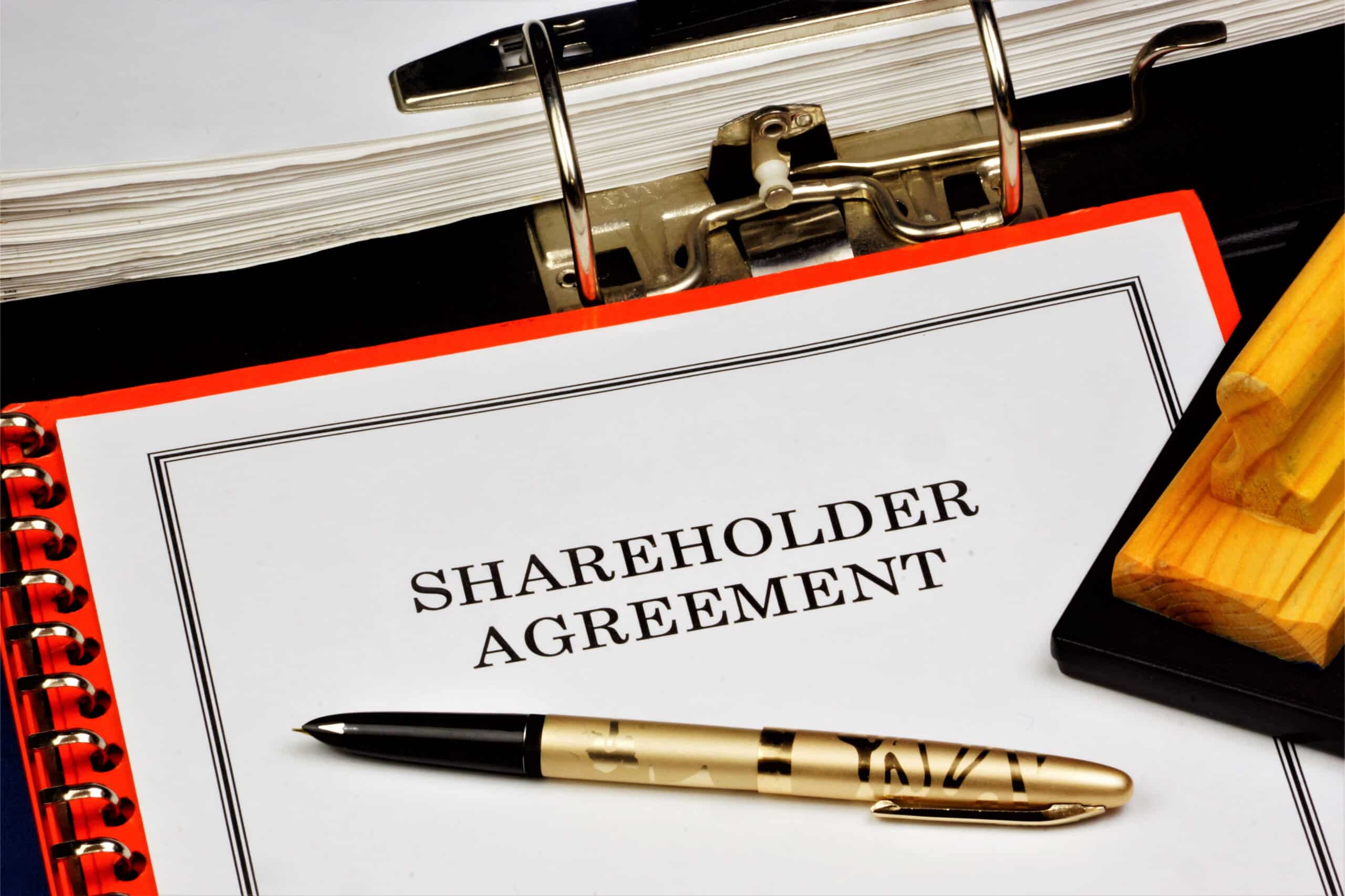A startup or company wanting to expand its business requires capital for these purposes. It raises capital in many ways like taking loans from banks, getting funds from angel investors, angel investor companies, funding investors, crowdfunding, etc., and in return the startup or company issues shares of its own to these investors. Such investors are called shareholders of the startup or company.
Thus the shareholders invest in the startup or company and in return own a stake in the startup or company. Now it is extremely important to make such a transaction between the shareholders and the startup or company, legally binding and enforceable and this is where a shareholders agreement comes into the picture.
A Shareholders agreement is basically an agreement between the shareholders and the company. It can be between all shareholders or a particular class of shareholders. It is a legal document showcasing the relationship between the shareholders and the company.
A shareholders agreement provides for the rights, obligations, and privileges of the shareholders. It protects the shareholders’ investment in the company and ultimately secures the interests of the shareholders. It also helps to resolve the disputes that might arise in the future between the shareholders and the startup or company which helps in maintaining a healthy relationship amongst them.
What is a Shareholders’ Agreement?
A Shareholders’ Agreement is a legally binding document that outlines the rights, responsibilities, and obligations of the shareholders of a company. It serves as a contract among the shareholders, providing a framework for how the company will be governed and how major decisions will be made. While specific terms may vary, a typical Shareholders’ Agreement includes provisions related to the following:
- Ownership and Shares: Specifies the number of shares each shareholder holds and any restrictions on the transfer of shares.
- Management and Decision-Making: Defines the powers and responsibilities of the shareholders, as well as how major decisions will be made. It may cover issues such as the appointment of directors, the issuance of new shares, and the approval of significant business transactions.
- Dividends and Distributions: Outlines the policy for distributing profits, including the timing and method of dividend payments.
- Exit Strategies: Addresses what happens if a shareholder wants to sell their shares, including pre-emption rights, rights of first refusal, and mechanisms for determining the fair value of shares.
- Dispute Resolution: Sets out procedures for resolving disputes among shareholders, which may include mediation, arbitration, or other mechanisms.
- Non-Compete and Confidentiality: Includes clauses to prevent shareholders from competing with the company or disclosing confidential information.
- Restrictions on Share Transfers: Places limitations on the transfer of shares to maintain control and prevent unwanted third-party ownership.
- Deadlock Resolution: Provides mechanisms for breaking deadlocks in decision-making when shareholders are unable to reach a consensus.
- Corporate Governance: Defines the structure of the board of directors, the frequency and format of shareholder meetings, and other governance-related matters.
A well-drafted Shareholders’ Agreement is crucial for protecting the interests of all shareholders and promoting a smooth operation of the company. It can be particularly valuable in closely-held or privately owned companies where the relationships among shareholders are significant. It is advisable for companies, especially startups, to consult with legal professionals when creating a Shareholders’ Agreement to ensure it meets the specific needs and circumstances of the business.
Legality of a shareholders agreement:
A shareholders agreement is not governed by any particular law or regulation in India. Thus it is not mandatory for the shareholders to enter into a shareholders agreement. But a shareholder investing a huge sum of money in a startup or company definitely might want to have his investment protected by getting some rights and authority in the startup or company and that is where he enters into a shareholders agreement. A shareholders agreement is a contractual agreement guided by the contract act and other legal principles and is binding in nature to the parties of such contract. This agreement is made in such a way that it aligns itself and conforms to the articles of the company, thus providing a legal remedy to the shareholders under the Company Act 2013 in case of breach. It is also important for shareholders to go through the articles of the company as it is a reflection of the shareholder’s agreement.
Prerequisites of shareholders agreement:
These are basically the elements that should be considered before making a shareholder’s agreement. It can include the business or profit intent of the parties, investment type, safety of the investment, representations, and warranty. Firstly it is important to know the business or profit or commercial intent of the parties. The shareholder or investor who is going to invest in the startup or company wants maximum return on his investment and also demands excellent performance and growth of the startup or company without any obstacles.
Whereas the startup or company i.e. the investee is specifically interested in getting funds and wants to operate independently without any interference from the investors. Secondly, it is important to specify or define in a shareholder’s agreement the type of investment or security that will be offered to the shareholders or investors. It can be equity shares, preference shares, debentures, hybrid securities, etc. Thirdly, the shareholders must have their investments protected. For this, it is necessary to keep a frequent watch over their investments. This is possible for the shareholders by getting affirmative voting rights, monthly or quarterly financial reports, budgeting plans, inspection rights, right of first refusal, etc. Fourthly, representations and warranties must provide details regarding the current status of the startup or company, its work, and the utilization of funds received from the investors.
Characteristics of a Shareholders’ Agreement
A Shareholders’ Agreement typically exhibits several key characteristics that distinguish it as a specialized contract governing the relationships and operations within a company. Here are some common characteristics:
- Legally Binding Contract: A Shareholders’ Agreement is a legally binding document that establishes contractual obligations and rights among the shareholders. It is enforceable by law.
- Tailored to the Company: The agreement is customized to the specific needs and circumstances of the company, taking into account its structure, industry, and the preferences of the shareholders.
- Private Document: Unlike the company’s Articles of Association, which are publicly filed, a Shareholders’ Agreement is a private document. It remains confidential among the parties involved.
- Governance Framework: It outlines the governance structure of the company, specifying the powers and responsibilities of the shareholders, directors, and officers.
- Decision-Making Procedures: The agreement includes provisions detailing how major decisions will be made, often requiring a certain level of consensus or majority vote among the shareholders.
- Rights and Obligations: Clearly define the rights and obligations of each shareholder, including issues related to share ownership, dividends, and participation in the management of the company.
- Protection of Minority Shareholders: Contains provisions to safeguard the rights of minority shareholders, ensuring their fair treatment and preventing undue influence by majority shareholders.
- Exit Mechanisms: Addresses exit strategies for shareholders, including provisions for the sale of shares, buy-sell agreements, and rights of first refusal.
- Dispute Resolution: Specifies mechanisms for resolving disputes among shareholders, such as through mediation, arbitration, or other agreed-upon procedures, to avoid litigation.
- Non-Compete and Confidentiality: May include clauses preventing shareholders from engaging in competitive activities and disclosing confidential company information.
- Duration and Termination: States the duration of the agreement and conditions under which it can be terminated or amended.
- Flexibility: Allows for flexibility in addressing the unique needs of the company and its shareholders, as opposed to more rigid statutory requirements.
- Complementary to Articles of Association: While the Articles of Association outline the basic rules for a company, the Shareholders’ Agreement supplements and enhances these rules, providing more detailed and tailored provisions.
- Review and Updating: Contains provisions for periodic review and potential updates to ensure its continued relevance and effectiveness.
- Legal Counsel Involvement: Typically involves legal professionals in its drafting to ensure legal compliance and to capture the specific intentions of the shareholders accurately.
Conclusion:
So in this blog, we have seen the importance of shareholders’ agreement, reasons for its requirement, purposes it serves, its enforceability and things to be considered before drafting it. In the next blog, we will see the basic differences between a share purchase agreement, a share subscription agreement, and a shareholders agreement.




